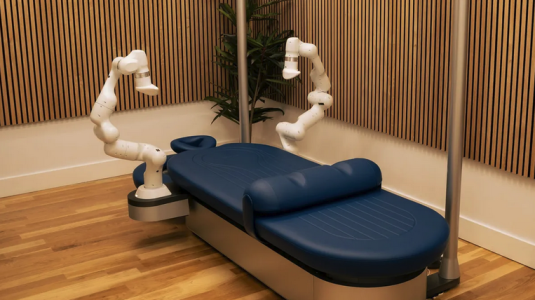N
Noelle Mateer
Guest

Hotel Tech-in is our regular feature that takes a closer look at emerging technology in the hospitality industry.
To say Aescape’s technology goes beyond that found in a massage chair is an understatement.
The New York City-based company launched in 2017 with the mission of designing a robot-powered massage that would feel just as satisfying as one given by a professional masseuse — without the hefty price tag or long spa waitlist.
Aescape’s product hit the market this year, and hotels are getting on board with the massage technology to cater to the growing number of travelers looking to maintain their wellness routines while on the road. Lotte New York Palace began offering Aescape massages earlier this year, and luxury properties including the Four Seasons Resort Orlando and Four Seasons Hotel Baltimore launched robotic massage this month. Aescape also told Hotel Dive that it will soon go live at the R+R Wellness Spa within the Grand Hyatt Nashville.
Hotel Dive sat down with Aescape Founder and CEO Eric Litman to discuss the customer base for robot massages, how they do — and don’t — overlap with traditional spa customers and where robot massages are headed in the future.
How it works
Besides the fact that they’re conducted by robots, there are a few more reasons why Aescapes’ massages are different from traditional ones. For one, clients get their massages fully clothed.
“You're not nude in front of a stranger,” Litman said, noting that brings in people who previously were uncomfortable getting massages at a spa. “It's really very autonomous, and gives people a tremendous amount of agency.”
Second, clients lie down with their arms stretched out in front of them, which allows them to use the built-in touchscreen to adjust their experience, and even the music playing, as the massage is happening.
Third, censors create a 3D model of a client’s body, which the robotic “arms” follow to create their massage. Plus, the arms are on either side of the massage table, meaning clients have both sides of their body massaged at once. “That's like having two people work on you, or one person spending twice the amount of time,” Litman said, noting that this allows Aescape massages to squeeze a lot of impact into the default length of 30 minutes.
Litman said artificial intelligence built into Aescape’s technology can learn from clients’ bodies and massage preferences, meaning massages will grow more effective over time.
Hotels can offer Aescape massages through a hardware subscription priced at $7,500 a month, which Litman said is “about the equivalent of an extended set of operating hours for bringing in a great massage therapist.”
Who’s interested
Aescape began seeking hospitality partners because “hospitality is such a natural fit for massage,” Litman said. And no, Litman added — none of its hotel partners are using the technology to replace human masseuses.
At the Four Seasons properties where Aescape is live, guests can book their Aescape session like any other spa treatment. Litman said having Aescape as an option allows hotels to accommodate guests booking treatments at the last minute, offering same-day, or even same-hour, appointments.
As Aescape looks to grow, it is seeking more partners in the hotel space, particularly in the premium to luxury hotel segments, Litman said.
“Our product doesn't need to be in a spa, but when it's in a spa, it really creates a lovely moment,” Litman said. Though the product has only been live for a few months, Litman said the company’s early data shows that Aescape is being used by regular massage-goers seeking something different, as well as by people hesitant to get a massage from a massage therapist.
Travelers increasingly wish to maintain their wellness routines while on the road, and hospitality companies are offering up creative amenities to cater to their demands, hotel industry experts told Hotel Dive in January.
Litman thinks robot massage can be one such wellness-oriented amenity. Aescape massages are for “people who are active in their life, who want to take care of their bodies, but time is of a premium to them,” he said.
Last edited by a moderator:






































































































